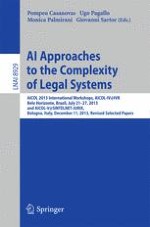2014 | Book
AI Approaches to the Complexity of Legal Systems
AICOL 2013 International Workshops, AICOL-IV@IVR, Belo Horizonte, Brazil, July 21-27, 2013 and AICOL-V@SINTELNET-JURIX, Bologna, Italy, December 11, 2013, Revised Selected Papers
Editors: Pompeu Casanovas, Ugo Pagallo, Monica Palmirani, Giovanni Sartor
Publisher: Springer Berlin Heidelberg
Book Series : Lecture Notes in Computer Science
